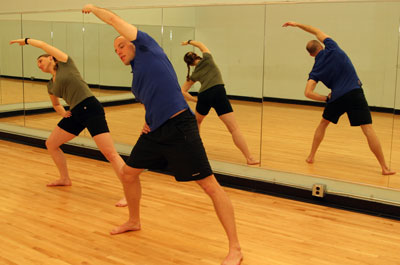
Participants in fitness classes expect instructors to help them exercise, putting instructors in a position of great responsibility. But what knowledges guide the instructor?
When it comes to working out, many of us throng to fitness classes. So the fitness industry and fitness instructors play an important role in helping people exercise.
However, we know surprisingly little about how fitness instructors deal with clients who have diverse needs and who are at different fitness levels in a class, how instructors' training prepares them for the commercial pressures of the industry, or what they think about their work in general.
In a new collaborative project, researchers and fitness industry professionals have joined forces to map how fitness instructors view their work with the goal of finding opportunities to advance their practice even further.
Socio-cultural researcher, Pirkko Markula; graduate student, Joy Chikinda, who is also the associate director of Campus Recreation, and Provincial Fitness Unit director Katherine MacKeigan will conduct the study over the next two years.
Unlike many research projects, says Markula, "This project began when we, also all fitness instructors ourselves, started to talk about how research can be far removed from the practice and does not always benefit the fitness practitioners. At the same time, we knew from our own experience that fitness instruction is a demanding profession with multiple, sometimes conflicting views about what is good and what is bad."
Based on previous research, Markula says, "We know that fitness practices are developed partly to prevent illness. This model results in tightly prescribed exercise programs designed to maximize their preventative effect. While it is definitely good to avoid becoming ill, many exercisers find these programs boring and often too strenuous and as a result drop out."
On the other hand adds Chikinda, "We know that many clients come to fitness classes to 'look better', to get a summer ready body, get rid of their 'flabby thighs, or 'tighten their tummies.' These clients often want to lose weight and increase tone to obtain the ideal body they see promoted in women's magazines or advertisements. Many fail and drop out. But we don't know how instructors negotiate these ways of understanding fitness. Or perhaps they teach fitness with other goals in mind? What do they think is good fitness instruction?"
"That's why this collaboration is important: to provide maximal benefits for all participants," says Markuka. "This faculty provides an excellent 'living laboratory' for this type of research project as it offers fitness instructor training and fitness instruction in addition to having researchers of fitness. In this inter-disciplinary research model the researchers and fitness professionals can work closely together to inform each others' views and practices."
Chikinda says Campus Recreation sees value in participating in the research. "We're very excited to find out what instructors think about their teaching practice and how participants view exercise. This will potentially offer valuable information and insight for our programmers for future programming."
MacKeigan, who heads up the Provincial Fitness Unit, is the executive director of the Alberta Fitness Leadership Certification Association which provides the only government-sanctioned, not-for-profit, certification for exercise leadership in Alberta. She says there are many influences on exercise leaders and their participants, including social media, and the internet. "The market changes -just like diet fads, there are exercise trends and fads as well. This research will help us to educate our leaders how to teach safely, within the boundaries of their expertise, respond to market trends, and their participants' expectations."
To map the field researchers will interview both instructors and exercisers. Once the team has a clearer picture of the field Markula says the research team plans to collaborate on looking at issues such as mentoring of fitness instructors. "Mentoring is a big thing in coaching," she says," so we think 'why not here?' Our premise is that mentors help to keep good practices going."